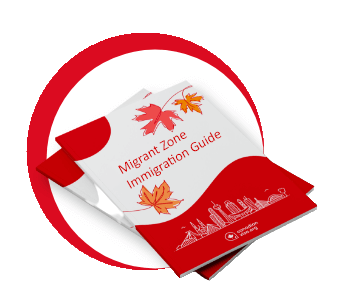
Studying abroad is an amazing opportunity that opens up a world of possibilities. You're not alone if you're a Nigerian student interested in studying in Canada. According to the Immigration Refugees and Citizenship Canada (IRCC) data, Nigeria is Canada's ninth most popular source country for international students, with a 30.3 percent increase in new study permits from just over 10,500 students in 2020 to lover 13,700 students in 2022. Not only does Canada offer excellent educational opportunities, but there are also immigration programs designed to help graduates become permanent residents. But before taking advantage of all Canada offers, you'll need to know how to apply for a study permit.
3 Steps to Apply For A Canadian Study Visa

There are a few important steps to ensure a successful Canadian study visa application. The following section outlines three key steps to apply for a Canadian study visa from Nigeria. These steps include choosing a Designated Learning Institution (DLI), checking your eligibility, and applying online. By following these steps, you can increase your chances of successfully obtaining a Canadian study visa and beginning your academic journey in Canada.
Step 1: Choose a Designated Learning Institution (DLI)
Before you can apply for a Canadian study visa, you need to have an acceptance letter from a Designated Learning Institution (DLI). A DLI is a post-secondary school, such as a university, college, or vocational school approved by the Canadian government to host international students.
It's important to choose a DLI because not all institutions in Canada are authorized to host international students. Without this designation, you cannot apply for a study visa.
Once you've found a DLI that meets your academic needs, you must apply and receive an acceptance letter. This letter is a crucial component of your study visa application and proves that you've been accepted into a recognized institution in Canada.
Step 2: Check Your Eligibility
After choosing a Designated Learning Institution (DLI), the next step is to check your eligibility to study in Canada. The Canadian government has set certain requirements for international students to be eligible for a study permit.
Eligibility requirements for studying in Canada:
- Be enrolled at a Designated Learning Institution (DLI).
- Demonstrate that you have sufficient funds to cover your tuition fees, living expenses, and return transportation costs for yourself and any accompanying family members.
- Abide by Canadian laws, have no criminal record, and obtain a police certificate if requested.
- Be healthy and complete a medical exam if requested.
- Prove to a Canadian immigration officer that you will leave the country once your study permit expires.
Once you are in Canada, you have certain responsibilities as an international student. You must progress towards completing your program and abide by any conditions listed on your study permit, such as whether you are allowed to work or travel within Canada. If you no longer meet the requirements, you must stop studying.
You must also change your DLI in your IRCC secure account before switching to a different institution and may need to undergo an immigration medical examination depending on your case. By checking your eligibility and fulfilling your responsibilities, you can enjoy a successful and fulfilling experience as an international student in Canada.
As a student in Canada, you can work both on and off-campus and through co-op and internship programs related to your field of study. As of last year, international students are allowed to work up to 40 hours per week during scheduled breaks in their academic calendar, and part-time (up to 20 hours per week) during regular academic sessions.
However, it is important to check the specific conditions of your study permit to ensure that you are eligible to work while studying in Canada. Working while studying can be a great way to gain valuable work experience, earn money to support your studies and living expenses, and enhance your resume.
Step 3: Apply Online
Now that you have chosen a DLI and checked your eligibility, it's time to apply for your Canadian study visa. The good news is that you can apply for your study permit online, outside or inside Canada. However, if you have a disability that prevents you from applying online or hold a non-national resident, refugee or stateless person's identity or travel document, you can apply on paper.
When applying for a study permit online, you must submit a letter of acceptance from the DLI you will be attending and any other required documents for a complete application. It's important to note that IRCC cannot finalize your study permit until you have submitted a complete application. Therefore, it's best to submit all necessary documents as soon as possible to avoid any delays in processing. If you are missing any documents due to COVID-19, you must provide a letter of explanation.
If you plan to study in Quebec, you must provide a valid attestation of issuance of your Quebec Acceptance Certificate (CAQ). Additionally, as part of the application process, you must provide your fingerprints and photo (biometrics) to IRCC for processing.
The Nigeria Student Express Pilot (NSE)

The Nigerian Student Express (NSE) pilot is reserved for students who have been accepted to a bachelor's or master's program at a designated learning institution in Canada. The average processing time is 20 days. You are still eligible for a study permit if you are studying another course, such as a diploma. You will just have to be patient with longer processing times of around eight weeks.
Eligibility Requirements for the NSE
- Be a legal resident of Nigeria;
- have an acceptance letter from a designated institution;
- prove you have paid your first year’s tuition;
- you must be living outside of Canada when you apply;
- purchase and provide proof of a guaranteed investment certificate showing a minimum of $10,000 from a Canadian bank, which you cannot access until you reach Canada;
- have a medical exam done;
- get a police clearance letter;
- provide your most recent secondary or post-secondary transcripts; and
- score a minimum of 6 on the Canadian Language Benchmark test.
Your spouse or common-law partner may even be eligible to come with you and work in Canada during your study period. All they have to do is apply for an open work permit. You are also eligible to work while you are studying in Canada.
Why Study in Canada?

Canada is one of the most popular study destinations for international students, and for good reason. Here are five reasons why Nigerians should consider studying in Canada.
High-Quality Education System
Canada is known for its high-quality education system, which consistently ranks among the best in the world. Canadian universities and colleges offer a wide range of programs, from undergraduate to graduate degrees, in various fields such as engineering, business, health sciences, and more. Canadian degrees are recognized globally and can open up many career opportunities for Nigerians.
Learn more about Canada's education system here.
Safe and Welcoming Environment
Canada is known for its friendly and welcoming culture, making it a great place for Nigerians to study abroad. The country is safe and peaceful, with low crime rates, making it a perfect place for international students to focus on their studies. Additionally, the Canadian government provides support services to international students, ensuring that they are well taken care of during their stay in Canada.
Learn more about Student life in Canada here.
Multicultural Society
Canada is a diverse country with a multicultural society, which means that Nigerians can experience and learn from different cultures while studying in Canada. Canadian universities and colleges are also known for their inclusive and diverse environment, promoting equality, and respect for all individuals.
Learn more about Multiculturalism here.
Work Opportunities
One of the benefits of studying in Canada is the opportunity to work while studying. International students can work up to 20 hours per week during the academic year and full-time during breaks, which can help cover the cost of living in Canada. Additionally, Canada offers various immigration programs that allow international students to stay and work in the country after graduation, providing a pathway to permanent residency.
Find out about Canada’s Post Graduate Permit Program.
Natural Beauty
Canada is known for its breathtaking natural beauty, from the Rocky Mountains to Niagara Falls. Studying in Canada allows Nigerians to explore and experience Canada's beautiful landscapes and outdoor activities. From skiing and snowboarding in the winter to hiking and camping in the summer, Canada offers a variety of activities that Nigerians can enjoy while studying there.
How Can We Help You Study in Canada

If you choose to make use of our services, you will be assigned your education consultant who will be available to advise and guide you through the entire process, all the way from applying to schools to getting your study visa. Your education consultant will work together with our accredited Regulated Canadian Immigration Consultants (RCICs), which will not only improve your chances of success in the visa application process, but you will get expert advice on which program is best for your specific needs.
Our RCICs are highly qualified and are granted permission by the ICCRC to assist you with your eligibility evaluation, review all your documents and application forms, and submit them to post-secondary institutions and the Canadian government for you.
FAQs
What Are the Healthcare Options for International Students Studying in Canada?
International students studying in Canada are required to have health insurance. Some universities and colleges may offer their own health insurance plans, while others may require students to purchase insurance through a designated provider. It's important for international students to research and understand their healthcare options before arriving in Canada to ensure they have adequate coverage.
What Are the Top Universities in Canada for International Students?
Canada has some of the best universities in the world, and there are many options for international students to choose from. According to the QS World University Rankings 2022, the top three universities in Canada are the University of Toronto, McGill University, and the University of British Columbia. Other top universities in Canada for international students include the University of Waterloo, the University of Alberta, and the University of Ottawa.
Find the right Canadian university for you with our university directory.
What Is the Cost of Studying in Canada as an International Student?
The cost of studying in Canada as an international student varies depending on the university, program, and location. International students can expect to pay between CAD 20,000 to CAD 30,000 per year for undergraduate programs and CAD 30,000 to CAD 40,000 per year for graduate programs. However, some universities are cheaper than others, and you could be paying as little as $15,000 for tuition at a DLI. In addition to tuition fees, international students must also budget for accommodation, food, transportation, and other living expenses. It's important to research and compares the costs of different universities and programs before making a decision. Learn more.



